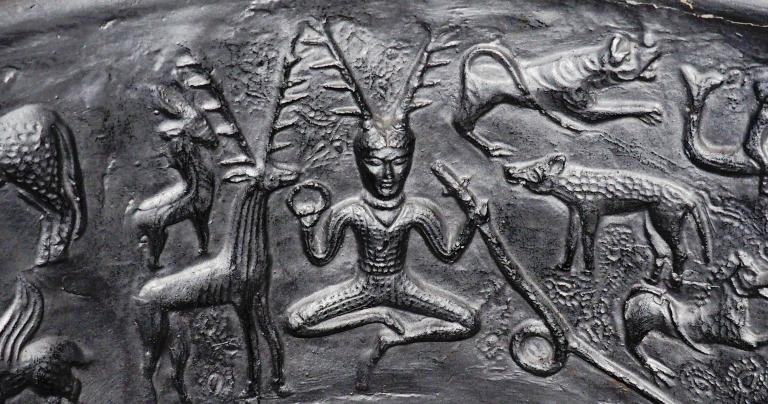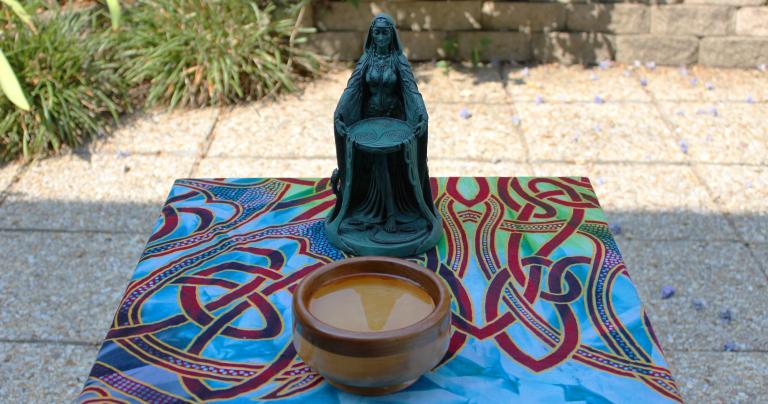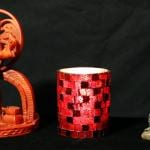Today’s question concerns discernment.
You’ve talked in the past that deities – as you define them – are divine because they are virtuous or the personification of virtues, not simply because they are powerful. However, you’ve also talked about how we don’t always understand the actions of deities, and it’s possible that something that looks petty or un-virtuous to us is actually just something where we are too human-focused and/or don’t see the big picture.
So as a polytheist Pagan who interacts with a variety of spiritual beings, how do you tell that one being is divine and virtuous, while another is not?
First, some context. As the questioner said, I believe the Gods are always virtuous. If it appears that They are acting in an unvirtuous manner (and from the stories of our ancestors, sometimes it does) then either those stories are inaccurate, or we do not completely understand them. I discussed this last year in Sometimes The Gods Take What They Want and Sometimes What They Want Is You and 6 Thoughts on Gods Claiming People.
I completely reject the idea that “They’re Gods so They can do whatever They want” or “who are you to tell a God what’s right and wrong?” That way lies Calvinism and its many ills. The Gods have a very different perspective from us. That different perspective leads Them to different values, and so They make different choices than we would… sometimes choices that puzzle us.
I think it’s better to live with that puzzlement than to deny the inherent virtue of the Gods.

But given the uncertain identities of the spiritual persons we encounter, the question in bold above is very relevant: how do you know that who (or Who) you’re talking to is divine and virtuous?
Gods and spirits don’t wear nametags
It would be so much easier if they did. Or if Gods were always 50 feet tall, or glowed like the sun, or spoke with an audible voice that filled you with unmistakable awe.
But they don’t.
Our first-hand experiences of Gods and spirits are usually subtle – they speak in whispers, not in shouts. And they rarely tell you who they are.
Perhaps that’s because there’s power in a name, and they don’t want to give you that power. Perhaps they think you should already know who they are. Or perhaps they want you to do the work of figuring it out for yourself.
Regardless of why, if you want to know who you’re dealing with, discernment is required.
The Gods are always virtuous – other spiritual persons aren’t
Gods do not lie1. The Fair Folk either cannot or will not lie, but they’re masters at twisting the truth2. Other spirits will flat-out lie to you. They will make you think they’re someone they’re not so you’ll feed them with offerings, do their work for them, or just provide them with some low-level amusement.
Obviously, then, if you discover a lie you’re not dealing with a God. But most spirits have been doing this a lot longer than you have – don’t count on spotting the deceptions.
Still, ordinary skepticism is a useful thing. If something sounds too good to be true, it probably is. If someone tells you exactly what you want to hear, they’re probably not being honest with you.
If they tell you what deep down you know is true only you wish it wasn’t, if they urge you to move on from what’s comfortable to what’s necessary, if they call you to participate in something bigger than yourself, it’s probably legitimate.

Research who you think it is
Take what you know and start trying to match it against known descriptions: those found in the stories of our ancestors, in the history of ancient worship (where such history exists), and in the accounts of contemporary priests and other devotees.
For Gods this is easier than you might think. They tend to make an impression on people. We remember Them, we worship Them, we write about Them. There’s reference material somewhere on virtually every deity ever known to humanity. And there’s probably someone already worshipping and/or working with Them who can help with your identification.
For non-divine spirits it’s much more difficult. We rarely have names in the historical record, lists of demons from grimoires notwithstanding. However, if you can’t positively identify a spirit as a God, it’s safer to assume they aren’t.
Talk to other polytheists – don’t try to do it all on your own. I can’t emphasize this enough. Our experiences of Gods and spirits are necessarily filtered through our own thoughts and feelings, which can keep us from seeing things that would be obvious to someone else. This is a very inexact science – the more experienced people involved, the better the chances of getting it right.

A God will not ask you to do unvirtuous things
The caveat here is that as we discussed in the introduction, we aren’t always certain what’s virtuous and what isn’t where the Gods are concerned. And virtues can be in conflict, as anyone who’s ever tried to be both honest and kind at the same time understands.
Still, you wouldn’t ask a friend to steal for you. You wouldn’t ask a Muslim friend to eat bacon. Ultimately that may not be very important, but it’s very important to them. If someone asks you to do something that strikes you as unvirtuous or just plain wrong, you’re probably not dealing with a God.
Just remember that “virtuous” doesn’t mean “nice.” I serve a Battle Goddess who knows that war is a terrible thing, but sometimes it’s a necessary thing.
Over time, you know
I wish I could be less vague. I wish I had a “God test” that would allow us all to know exactly who and what the spiritual beings we encounter really are. But this is all I’ve got.
I’ve been fooled before. A more experienced friend stepped in before any harm was done… which just reinforces the need to talk these things through with other people, ideally people who’ve done it before.
The main thing is to keep at it. Each experience is another data point. Each book, blog post, or conversation is another point for comparison.
If another human moves into the house next door to you, initially you know nothing about them. Even after all the introductions and pleasantries, you still don’t know if you like them, or if you can trust them. But the more you’re around them the more you get to know who and what they are. After a while you learn who will be there when things get tough, and who’s just looking to see what they can get from you.
Of course, while you’re doing that with them, they’re doing the same with you.
It’s not all that different with Gods and spirits. Over time we learn who we can trust, who’s worth following, and who we would just as soon avoid. They learn the same about us.
Most good relationships begin with hospitality and are maintained through reciprocity.
Blessings to you as you form and maintain good relationships with the spiritual persons you encounter, divine and otherwise.
1 See Gordon Cooper’s comment below, and my response.
2 This is a well-known warning from fairy lore. In my experience, fairy royalty will be as honest with you as you are with them, though caution is still recommended. They may be your neighbors, but they are not your friends. Lower-ranking fae, well, they’re mostly where those warnings came from. Unless you have the skills of both a lawyer and a bard, you’re probably going to come out on the short end of the deal.















